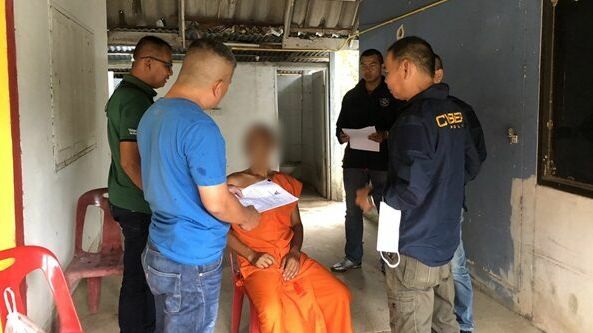Monk-led scam network dupes victims of 2 million baht posing as tax officials

A man part of a scam network passing off as a tax official was today apprehended by cyber police forces at a renowned temple in Kamphaeng Phet province. The 46 year old suspect allegedly defrauded victims of over 2 million baht (US$57,414) through a deceptive application.
Major General Worawut Watnakornbancha, head of the Cyber Crime Investigation Bureau (CCIB) apprehended the suspect, Annop. Led by Annop, the scammers posed as representatives from the Revenue Department and convinced their victims that their taxes would be lowered. They would then provide a link, which when clicked upon, would compromise the victim’s mobile device and drain their linked bank accounts.
The scam came to light when a number of affected parties approached the second regional office of the CCIB with complaints about a gang operating call centres, who allegedly spoke with them posing as tax officials.
One victim shared that they were informed their taxes would be lowered, and they didn’t need to come to the office in person. Instead, they were instructed to follow a line link and follow the steps mentioned. After this, their mobile phone froze. Once they regained control of their device, they discovered that approximately 2 million baht had been transferred out from three of their bank accounts linked with the banking applications, reported KhaoSod.
After thorough investigations and evidence gathering, it was revealed by Police Captain Morkot Saengsaku, the office head of the second region of CCIB, that the suspect was a monk living in a prominent temple in Sai Ngam, Kamphaeng Phet province. An arrest warrant was obtained from the Mahasarakham Provincial Court, and the suspect was taken into custody.
Police Lieutenant Colonel Sathit Phrommutai, the third office head of CCIB, issued a warning to taxpayers to be vigilant against such fraudulent practices. He noted that there have been several cases seen last year where scammers posed as Revenue Department officials and cheated taxpayers.
They would falsely claim tax refunds, declare unpaid taxes, or mislead them in other ways, stipulating conditions to follow a fake link sent via the LINE application, or to provide a six-digit OTP, all under the guise of facilitating the process. He urged the public not to fall for such false pretences of tax officials calling or sending SMS to inform citizens to file their annual taxes, as it may result in potential loss of assets.
Latest Thailand News
Follow The Thaiger on Google News:


























